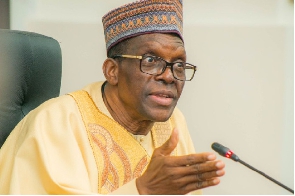A coalition of civil society organisations (CSOs) on environmental protection has petitioned the speaker of Parliament, Alban Sumana Kingsford Bagbin, to annul the Environmental Protection (Mining in Forest Reserves) regulation – Legislative Instrument 2462 (L.I.).
The L.I., they argued, allows institutionalised mining in forest reserves without restrictions, casting a dark shadow on the ecological integrity of the country’s forest resources and commitment to environmental sustainability and conservation.
According to the CSOs, the said legislative instrument (L.I. 2462) violates the constitution and other laws that safeguard forests, and is also hindering Ghana’s progress in protecting forests and efforts aimed at combating the scourge of climate change repercussions over the years.
Explaining further, the 21-member strong coalition, in their petition to the Speaker of Parliament, the current state of the L.I. 2462, as approved by Parliament, establishes legal mining procedures within forest reserves. These reserves are designated by legislation to safeguard forests from destruction. Consequently, it (L.I. 2462) potentially permits miners to damage these reserves, which were specifically designated to safeguard forests and the wildlife within them.
Moreover, the civil society organisations (CSOs) bemoan that the passage of L.I. 2462 lacked broader consultation with relevant stakeholders, which could harm conservation efforts aimed at combating deforestation, biodiversity depletion, pollution and climate change.
Institutional conflict between Minerals Commission and EPA casts clouds on mining laws
Among other things, the coalition asserts that the regulation of mining in forest reserves by the Environmental Protection Agency (EPA) through the L.I. 2462 raises serious constitutional and institutional apprehension.
According to them, the 1992 Constitution vests the power of regulating and managing the mineral resources and the coordination of related policies in the natural resources commission of the country established either by the Constitution or the Parliament of Ghana.
In contrast, the L.I. 2462 empowers the Environmental Protection Agency (EPA) to oversee and control the utilisation of mineral resources. This, they say is an impingement on the mandate of the Minerals Commission, and it is beyond the scope of the EPA’s stipulated functions in its establishment legislation.
To this end, the EPA as established by the Environmental Protection Agency Act of 1994 (Act 490), is not a natural resource commission. While the EPA has a vast mandate, it does not circumscribe the regulation and management of natural – specifically forest or mineral – resources.
This specific role, they say, is designated to the Forestry and Minerals Commissions, respectively. The passing of L.I. 2462 by the EPA underscores a clear overreach on its part, superseding the legitimate functions of the Forestry and Minerals Commissions, and thereby violating the constitutional directives regarding managing natural resources in Ghana.
Hence, the L.I. 2462 enacted by the EPA lacks legislative backing, undermining the instrument’s legal basis, which renders it unconstitutional and a clear override of the minister’s authority.
Pre-emption of undelegated executive authority by the EPA
According to the CSOs, the country’s forest reserves are created by the President through Executive Instrument and are managed by the Forestry Commission on behalf of the government. The President’s power to declare land as ceasing to exist as a forest reserve is exercised through an Executive Instrument.
This legislative structure has the essential distinction that it is only the President who has the power to change the rights and characteristics associated with a forest reserve through an Executive Act.
Hence, without an Act of Parliament or an Executive Instrument, the legal protections granted to land classified as a forest reserve cannot be overridden, they noted.
It’s important to note that the L.I. 2462 is a Legislative Instrument promulgated by an administrative body (EPA), and it does not carry the legislative legitimacy required to override the protections granted to forest reserves through an Executive Instrument.
They said that while there may not be a specific judicial ruling or statutory provision addressing the conflict between an Executive Instrument (E.I.) and a Legislative Instrument (L.I.), existing case law and legal principles make it abundantly clear that an L.I. cannot implicitly repeal an E.I.
Background
The Environmental Protection (Mining in Forest Reserves) Regulations, 2022 (L.I.2462) was passed on the 23rd of June, 2022 in the exercise of the powers conferred on the Minister responsible for the Environment by Section 62(1) of the Environmental Protection Agency Act, 1994 (Act 490).
The purpose of the L.I. is to provide for mining activities in forest reserves and other related matters.
In the early part of November 2023, the civil society organisations on environmental terrain organised a stakeholder engagement concerning the new regulations on mining in the country’s forest reserves, which took place in Accra.
Following this engagement, the CSOs have forwarded a petition to the country’s Speaker of Parliament to affect the revocation of the Legislative Instrument (L.I 2462) – a law they describe as retrogressive.
Business News of Wednesday, 20 December 2023
Source: thebftonline.com













